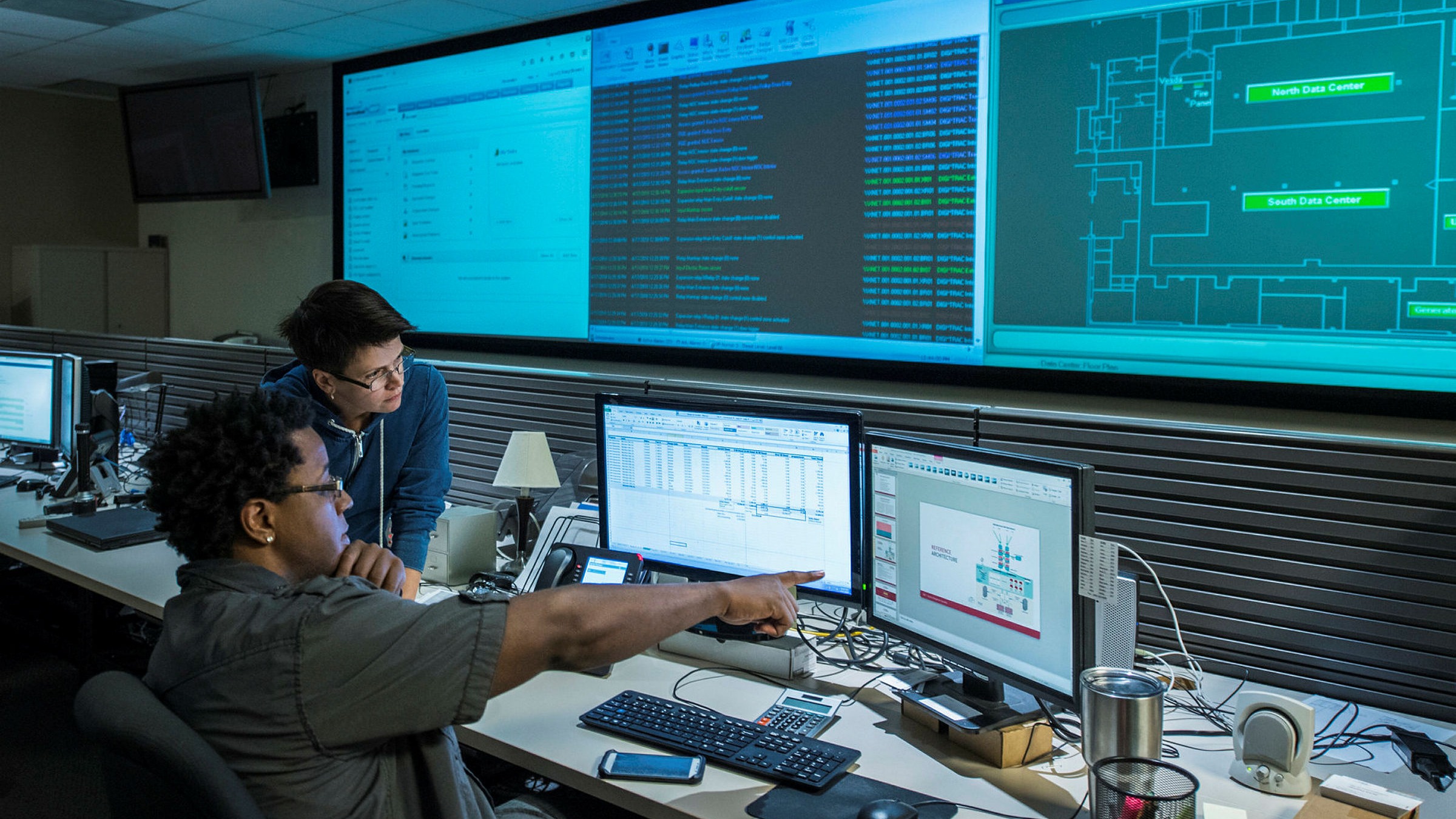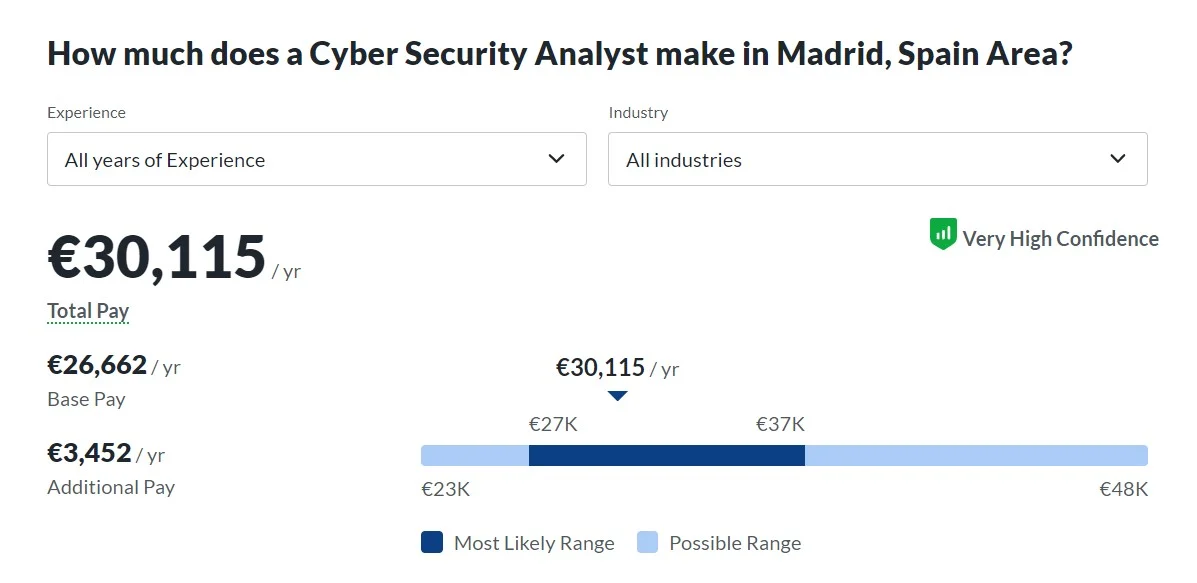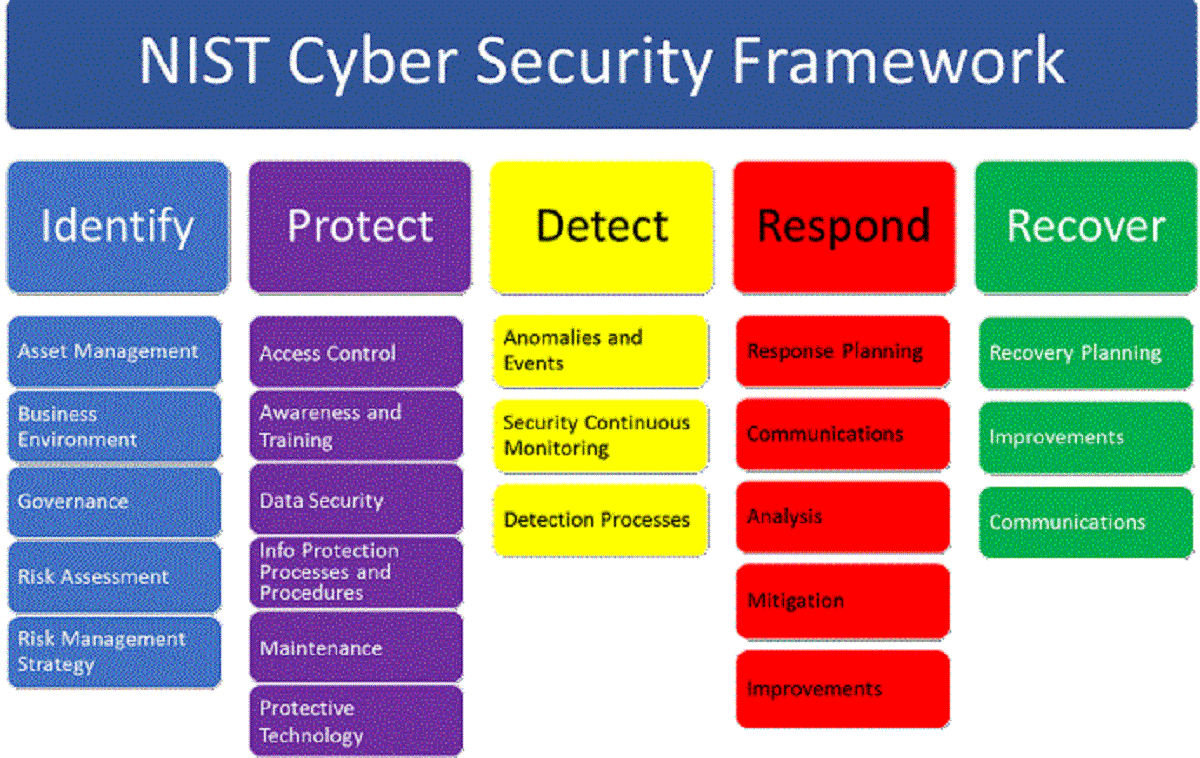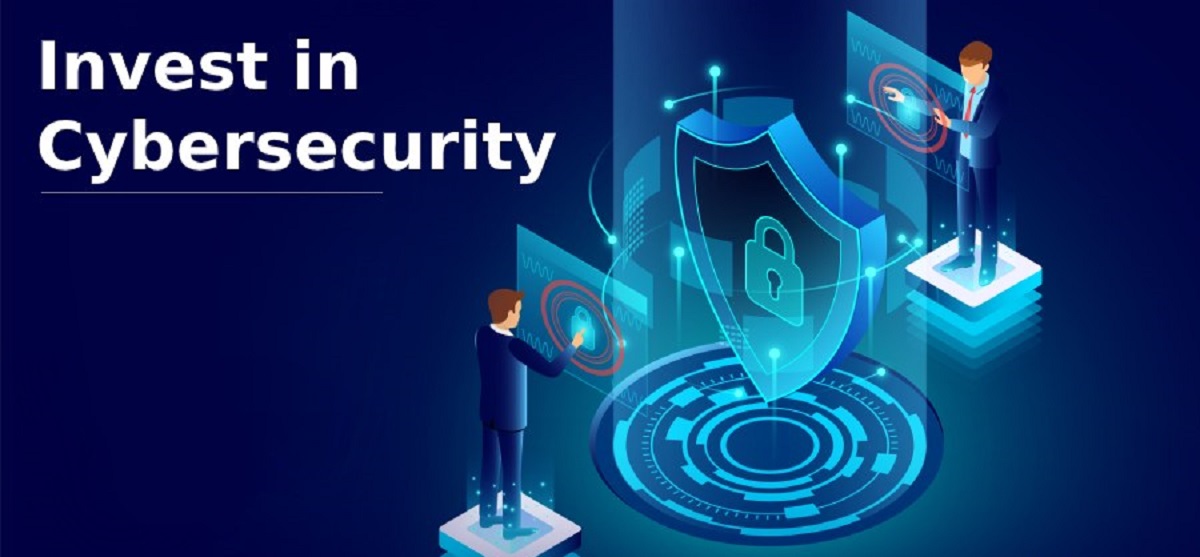Introduction
Welcome to the world of cybersecurity! In today’s digital age, where almost everything is connected through the internet, ensuring the security of data and information has become of utmost importance. Cybersecurity professionals play a crucial role in safeguarding sensitive information and protecting individuals, organizations, and governments from cyber threats.
Cybersecurity refers to the practice of defending computer systems, networks, and data from unauthorized access, cyber attacks, and other potential risks. It involves various strategies, technologies, and procedures aimed at detecting, preventing, and responding to security breaches.
In this article, we will explore the roles and responsibilities of cybersecurity professionals, highlighting the diverse skill sets and qualifications required for success in this field. We will delve into various job titles, such as cybersecurity analyst, security engineer, incident responder, security architect, forensics expert, penetration tester, and cryptographer. Additionally, we will discuss the essential skills and qualifications needed, the career outlook, and the exciting opportunities available in the cybersecurity field.
Without further ado, let’s dive into the world of cybersecurity and unravel the mysteries and challenges faced by these dedicated professionals who work tirelessly to ensure the confidentiality, integrity, and availability of vital information.
Understanding Cybersecurity
Cybersecurity is a multidimensional field that encompasses various disciplines and technologies to protect digital systems, networks, and data from unauthorized access, malicious attacks, and breaches. It involves implementing proactive measures to safeguard information and respond effectively to incidents and vulnerabilities.
At its core, cybersecurity aims to maintain the confidentiality, integrity, and availability of data. Confidentiality refers to protecting sensitive information from unauthorized disclosure. Integrity ensures that data remains accurate, complete, and reliable. Availability ensures that data and systems are accessible when needed.
The threat landscape in cyberspace is constantly evolving, with cybercriminals becoming more sophisticated and innovative in their techniques. These threats can range from phishing attacks and malware infections to advanced persistent threats and ransomware. Therefore, it is imperative for cybersecurity professionals to stay updated on the latest threats and trends to counteract them effectively.
Cybersecurity strategies involve a combination of preventive, detective, and responsive measures. Preventive measures include implementing firewalls, antivirus software, and secure network configurations to block potential threats. Detective measures involve monitoring systems for suspicious activities and detecting breaches in real-time. Responsive measures focus on incident response plans, disaster recovery, and business continuity to minimize the impact of a security breach.
Moreover, cybersecurity extends beyond just technological solutions. It also involves educating and training users about safe online practices to prevent social engineering attacks. Regular security audits and vulnerability assessments are conducted to identify weaknesses and ensure compliance with industry standards and regulations.
Another important aspect of cybersecurity is risk management. Organizations need to assess the potential threats, prioritize them based on their impact and likelihood, and develop risk mitigation strategies accordingly. This involves identifying critical assets, analyzing potential vulnerabilities, and implementing appropriate controls.
Understanding the principles and fundamentals of cybersecurity is essential for all individuals and organizations in today’s interconnected world. By implementing robust cybersecurity measures, we can create a safer digital environment and protect ourselves from the ever-evolving threats lurking in cyberspace.
Roles and Responsibilities
Cybersecurity professionals assume various roles and responsibilities to ensure the security and integrity of digital systems, networks, and data. Each role requires a specific skill set, expertise, and understanding of the rapidly evolving cyber threat landscape. Let’s explore some of the key roles in the cybersecurity field:
1. Cybersecurity Analyst
A cybersecurity analyst is responsible for monitoring and analyzing security systems, identifying vulnerabilities, and assessing the organization’s overall security posture. They conduct risk assessments, implement security measures, and investigate security incidents to mitigate potential risks.
2. Security Engineer
A security engineer designs and implements secure network architectures, systems, and applications. They configure firewalls, encryption protocols, and access controls to protect sensitive information and ensure the integrity of the organization’s infrastructure.
3. Incident Responder
An incident responder is the first line of defense when a security incident occurs. They investigate and respond to security breaches, perform forensic analysis, and develop incident response plans to minimize the impact of an attack and prevent future incidents.
4. Security Architect
A security architect develops and maintains the organization’s security architecture, ensuring that it aligns with industry best practices and regulatory requirements. They design secure systems, define security policies, and oversee the implementation of security controls.
5. Forensics Expert
A forensics expert extracts and analyzes digital evidence from compromised systems to identify the cause and impact of a security incident. They collaborate with law enforcement agencies, document findings, and provide expert testimony in legal proceedings when necessary.
6. Penetration Tester
A penetration tester, also known as an ethical hacker, identifies vulnerabilities in systems and networks by performing controlled attacks. They evaluate security defenses, conduct penetration testing, and provide recommendations to enhance the organization’s security posture.
7. Cryptographer
A cryptographer develops cryptographic algorithms and protocols to protect data and ensure secure communications. They analyze encryption methods, design secure cryptographic solutions, and evaluate the strength of cryptographic systems.
These roles are just a glimpse into the diverse and evolving landscape of cybersecurity. It is important to note that different organizations may have variations in job titles and responsibilities based on their specific needs and industry requirements. Regardless of the specific role, all cybersecurity professionals share a common goal of safeguarding digital assets and maintaining the confidentiality, integrity, and availability of information in an increasingly connected world.
Cybersecurity Analyst
A cybersecurity analyst plays a vital role in protecting organizations from security threats and ensuring the integrity of their digital systems. They are responsible for monitoring security systems, analyzing potential vulnerabilities, and assessing the overall security posture of the organization.
One of the primary responsibilities of a cybersecurity analyst is to identify and analyze potential risks and security breaches. They monitor network traffic, log files, and security alerts to detect any suspicious activities. By leveraging security information and event management (SIEM) tools, they can identify potential threats and take immediate action to mitigate risks.
Furthermore, cybersecurity analysts conduct comprehensive risk assessments to evaluate the organization’s vulnerability to cyber attacks. They analyze network infrastructure, systems, and applications to identify potential security gaps. This helps in developing a proactive approach to security by implementing necessary controls and measures to prevent potential breaches.
When a security incident occurs, cybersecurity analysts are responsible for investigating the incident and providing incident response support. They perform forensic analysis to determine the cause and impact of the breach, identify the compromised systems, and develop strategies to contain the incident. Their swift response helps minimize the damage caused by the breach and prevent any further harm to the organization.
In addition, cybersecurity analysts are responsible for maintaining and updating security policies, procedures, and documentation. They ensure that the organization’s security measures comply with industry regulations and standards. They also collaborate with other departments to educate employees on best practices for data protection and security awareness.
Continuous monitoring and improvement of security systems is another crucial aspect of a cybersecurity analyst’s role. They proactively propose and implement security enhancements, such as firewall configurations, intrusion prevention systems, and access control mechanisms. By staying updated on the latest threats and security trends, they can identify emerging risks and recommend necessary adjustments to the organization’s security infrastructure.
Overall, the role of a cybersecurity analyst is essential in maintaining a robust security posture for organizations. Their proactive monitoring, assessment, and incident response mechanisms ensure the security of sensitive data and safeguard against potential cyber threats.
Security Engineer
A security engineer is a key professional responsible for designing and implementing secure network architectures, systems, and applications. They play a critical role in safeguarding an organization’s infrastructure and ensuring the integrity of its digital systems.
One of the primary responsibilities of a security engineer is to assess the organization’s security needs and develop plans to protect its digital assets. They collaborate with other teams, such as software developers and network administrators, to ensure that security measures are integrated into every aspect of the organization’s systems and applications.
Security engineers design and implement security protocols and controls to mitigate potential risks and vulnerabilities. They configure firewalls, intrusion detection systems (IDS), and other security tools to protect against unauthorized access and cyber attacks. By implementing encryption protocols, they ensure that data remains secure during transmission and storage.
Security engineers are also responsible for conducting vulnerability assessments and penetration testing. They identify potential weaknesses in the organization’s systems and networks and simulate real-world attacks to evaluate their security controls. This enables them to proactively address vulnerabilities and enhance the overall security posture of the organization.
In addition, security engineers collaborate with software developers to ensure that security is an integral part of the software development life cycle. They provide guidance on secure coding practices and conduct code reviews to identify and mitigate potential security flaws. By incorporating security into the development process, they help prevent potential vulnerabilities from being introduced into the organization’s applications.
Furthermore, security engineers are responsible for monitoring and responding to security incidents. They investigate security breaches, perform forensic analysis, and develop incident response plans. Their swift and effective response helps minimize the impact of an incident and ensure that systems are restored to a secure state.
Continuous learning and staying up-to-date with the latest industry trends and emerging security threats are vital for security engineers. They actively engage in professional development activities, such as attending conferences and obtaining relevant certifications, to enhance their skills and knowledge. This enables them to adapt to evolving threats and implement up-to-date security measures.
In summary, security engineers play a crucial role in designing and implementing secure systems and applications for organizations. Their expertise and proactive approach to security ensure that an organization’s digital infrastructure remains protected from potential threats and vulnerabilities.
Incident Responder
An incident responder is a crucial role in the field of cybersecurity, responsible for detecting, responding to, and mitigating security incidents within an organization. Incident responders play a critical role in minimizing the impact of security breaches and ensuring the organization’s systems are restored to a secure state.
When a security incident occurs, the incident responder is often the first line of defense. Their primary responsibility is to quickly identify and respond to security breaches to prevent further damage. They analyze and investigate the incident, gather evidence, and determine the scope and impact of the breach.
Incident responders utilize various tools and technologies to collect and analyze data from affected systems. By conducting forensic analysis, they can uncover the root cause of the incident and identify the extent of the compromise. This information is crucial for developing an effective incident response strategy.
Once the incident is contained, the incident responder plays a vital role in restoring the organization’s systems to a secure state. They work closely with IT teams to remove any malware, patch vulnerabilities, and ensure that systems are protected from future attacks. They also provide recommendations for improving security controls and procedures to prevent similar incidents from occurring in the future.
In addition, incident responders collaborate with internal teams and external stakeholders during the incident response process. This includes working with legal, public relations, and law enforcement agencies, if necessary, to handle the legal and public aspects of the incident. Effective communication and coordination are essential to ensure a timely and efficient response.
Continuous learning and staying up-to-date with the latest attack techniques and incident response best practices are crucial for incident responders. They need to constantly update their skills to effectively handle new and evolving security threats. This includes keeping abreast of the latest incident response tools and technologies and participating in regular training programs and exercises.
Ultimately, incident responders are at the forefront of incident management and play a vital role in ensuring the organization’s resilience against cyber threats. Their quick response, forensic expertise, and collaboration skills are essential in mitigating the impact of security incidents and minimizing the potential damage to an organization.
Security Architect
A security architect is a key role in the field of cybersecurity, responsible for designing and maintaining the security infrastructure of an organization. Security architects play a critical role in ensuring that systems, networks, and applications are built with strong security measures to protect against potential threats and vulnerabilities.
One of the primary responsibilities of a security architect is to develop and implement a robust security architecture. They assess the organization’s security needs, understand its risk profile, and design security controls and frameworks to address those risks. This includes defining security policies, standards, and guidelines that align with industry best practices and compliance requirements.
Security architects work closely with stakeholders across the organization, including IT teams, management, and users. They collaborate to understand system requirements and integrate security measures into the design and implementation process. By embedding security from the ground up, they ensure that security is an integral part of the system’s architecture and not an afterthought.
Furthermore, security architects are responsible for evaluating and selecting appropriate security technologies and tools. They assess the effectiveness and suitability of various security solutions and make informed decisions on their implementation. This includes evaluating firewalls, intrusion detection systems, encryption algorithms, and access controls to mitigate potential risks.
Security architects also conduct risk assessments and vulnerability analyses to identify potential weaknesses in the organization’s systems and networks. Through vulnerability scanning and penetration testing, they identify vulnerabilities and develop strategies to address them. By staying up-to-date with the latest security trends and threat landscape, they can proactively identify emerging risks and design appropriate security controls.
In addition to proactive security measures, security architects also play a vital role in incident response and disaster recovery planning. They develop and maintain incident response plans, define incident-handling procedures, and coordinate with incident responders in case of a security breach. Their expertise ensures that the organization is well-prepared to respond effectively to incidents and recover quickly.
Continuous learning and professional development are crucial for security architects. They stay updated with the latest security standards, industry best practices, and emerging technologies. This enables them to adapt to evolving threats and ensure that the organization’s security architecture remains robust.
In summary, security architects play a critical role in designing and maintaining secure systems for organizations. Their expertise in security architecture, risk assessment, and incident response helps ensure that the organization’s digital assets are protected against potential threats and vulnerabilities.
Forensics Expert
A forensics expert is a highly skilled professional in the field of cybersecurity who specializes in collecting, analyzing, and interpreting digital evidence in the aftermath of a security incident. Forensics experts play a critical role in investigating cybersecurity breaches, identifying the cause and impact of the incident, and providing expert insights to support legal proceedings if necessary.
One of the primary responsibilities of a forensics expert is to conduct forensic analysis on compromised systems and networks. They use specialized tools and techniques to collect and preserve digital evidence such as log files, metadata, and network traffic. By analyzing this evidence, they can reconstruct the sequence of events leading to the incident and uncover the extent of the damage.
Forensics experts collaborate closely with incident responders and other cybersecurity professionals during the incident response process. They work together to identify and contain the security breach, ensuring that critical evidence is not compromised in the process. Their expertise in forensic procedures and evidence handling is essential to maintain the integrity and admissibility of the evidence.
Depending on the nature of the incident, forensics experts may also collaborate with legal teams and law enforcement agencies. They provide expert testimony and assist in legal proceedings, ensuring that the evidence collected is admissible in court. Their expertise in digital forensics and knowledge of legal requirements contribute to the successful prosecution of cybercriminals.
In addition to incident response and legal support, forensics experts play a proactive role in preventing future security incidents. They analyze attack patterns, examine malware samples, and identify trends in cybercriminal activities. By understanding the techniques and tools used by attackers, they can provide insights to enhance the organization’s security measures and prevent similar incidents from occurring in the future.
Continuous learning and staying abreast of the latest forensic techniques and tools are paramount for forensics experts. The field of digital forensics is constantly evolving, with new technologies and attack vectors emerging regularly. Forensics experts actively participate in training programs, attend conferences, and collaborate with peers to stay updated and maintain their expertise.
In summary, forensics experts are crucial in the cybersecurity landscape, providing expert analysis and interpretation of digital evidence. Their skills in forensic procedures, evidence handling, and collaboration support incident response efforts and legal proceedings. By leveraging their expertise, organizations can effectively investigate security incidents, strengthen their security posture, and bring cybercriminals to justice.
Penetration Tester
A penetration tester, also known as an ethical hacker, is a skilled cybersecurity professional who specializes in identifying vulnerabilities in systems, networks, and applications. Their role is to simulate real-world attacks on an organization’s infrastructure to uncover potential weaknesses and help strengthen its security defenses.
One of the primary responsibilities of a penetration tester is to conduct controlled attacks on systems and networks. They use a combination of automated tools and manual techniques to identify vulnerabilities that could be exploited by malicious actors. By simulating real-world attacks, penetration testers can assess the effectiveness of security controls and determine the organization’s susceptibility to various cyber threats.
Penetration testers work closely with organizations to define the scope and objectives of the testing process. They collaborate with system administrators, developers, and other stakeholders to ensure that the testing activities do not disrupt critical operations. This involves thorough planning, adherence to ethical guidelines, and obtaining proper consent before conducting any testing activities.
During the testing process, penetration testers employ a wide range of techniques, including network scanning, vulnerability scanning, and password cracking. They analyze the results and provide detailed reports that highlight the identified vulnerabilities, their potential impact, and recommendations for remediation. These reports enable organizations to patch vulnerabilities and improve their overall security posture.
In addition to identifying vulnerabilities, penetration testers also play a vital role in educating organizations about secure coding and best practices for system and network configuration. They provide guidance and recommendations to developers, system administrators, and other relevant personnel on how to strengthen security measures and prevent common attack vectors.
Continuous learning and staying up-to-date with the latest attack techniques and defense mechanisms are crucial for penetration testers. The cybersecurity landscape is constantly evolving, with new vulnerabilities and attack vectors emerging regularly. Penetration testers actively engage in ongoing research, participate in security conferences, and conduct independent studies to enhance their skills and stay informed about the latest developments in the field.
In summary, penetration testers are essential in helping organizations identify vulnerabilities and strengthen their security defenses. By simulating real-world attacks, they provide valuable insights into potential weaknesses that could be exploited by cybercriminals. Through thorough testing, reporting, and collaboration, penetration testers enable organizations to enhance their security measures and protect their digital assets from potential threats.
Cryptographer
A cryptographer is a specialized cybersecurity professional who focuses on developing cryptographic algorithms and protocols to ensure the confidentiality, integrity, and authenticity of data. Cryptographers play a crucial role in safeguarding sensitive information, securing communications, and enabling secure transactions in the digital world.
One of the primary responsibilities of a cryptographer is to design and develop secure cryptographic algorithms. They leverage mathematical principles and complex algorithms to create encryption methods that protect data from unauthorized access. Cryptographers use techniques such as symmetric encryption, asymmetric encryption, hash functions, and digital signatures to provide various levels of security for different applications.
To ensure the effectiveness of cryptographic algorithms, cryptographers analyze their security levels through extensive mathematical testing and analysis. They assess the resistance of algorithms against known attacks and vulnerabilities to ensure that the encryption schemes are robust and cannot be easily compromised. This involves studying advancements in cryptanalysis and staying updated with the latest cryptographic research.
In addition to designing secure algorithms, cryptographers also collaborate with other cybersecurity professionals to implement cryptographic protocols in real-world systems. They work with software developers and system architects to integrate security measures into applications and infrastructure designs. Cryptographers provide recommendations on how to use cryptographic algorithms effectively and implement secure key management practices.
Another important responsibility of cryptographers is to evaluate the strength of existing cryptographic systems. They assess the security of algorithms and cryptographic implementations to identify potential weaknesses or vulnerabilities. By analyzing real-world implementations, cryptographers can provide recommendations for improving security measures and prevent potential attacks.
Cryptographers are also involved in the development and implementation of secure communication protocols. They ensure that data exchanged over networks, such as the internet, cannot be intercepted or tampered with by unauthorized individuals. Cryptographers play a central role in developing protocols like Transport Layer Security (TLS) and Secure Socket Layer (SSL) that secure connections and enable secure communication.
Continuous learning and engagement in cryptographic research are essential for cryptographers. They stay updated on the latest advancements in encryption techniques and cryptographic protocols. By participating in conferences, publishing research papers, and actively collaborating with peers, cryptographers enhance their knowledge and contribute to the ongoing development of cryptographic science.
In summary, cryptographers are integral to the cybersecurity ecosystem, providing secure solutions to protect data and enable secure communication. Their expertise in designing cryptographic algorithms, evaluating system security, and developing secure protocols ensures that sensitive information remains confidential, secure, and resistant to unauthorized access.
Skills and Qualifications
Cybersecurity professionals require a diverse set of skills and qualifications to effectively protect digital systems, networks, and data from cyber threats. Let’s explore some of the key skills and qualifications that are essential in this field:
1. Technical Knowledge
A deep understanding of computer systems, networks, operating systems, and security technologies is crucial for cybersecurity professionals. They should be familiar with programming languages, network protocols, and encryption methods. Proficiency in areas such as vulnerability assessment, penetration testing, and incident response is also essential.
2. Problem-solving
Cybersecurity professionals need excellent problem-solving skills to identify vulnerabilities, analyze complex security issues, and develop effective solutions. They must be able to think critically and creatively to anticipate potential threats and develop strategies to mitigate risks. Strong analytical and troubleshooting skills are invaluable in quickly resolving security incidents.
3. Communication and Collaboration
Effective communication and collaboration skills are essential in cybersecurity roles. Cybersecurity professionals often work as part of cross-functional teams, collaborating with stakeholders from different departments. They need to effectively communicate security risks, recommendations, and incident findings to technical and non-technical audiences. Additionally, they must be able to collaborate and coordinate with incident response teams, legal departments, and law enforcement agencies.
4. Continuous Learning
The field of cybersecurity is constantly evolving, with new threats and technologies emerging regularly. Cybersecurity professionals need to have a strong desire for continuous learning and keeping up with the latest industry trends and advancements. They should actively seek out professional development opportunities, attend cybersecurity conferences, and engage in training to stay updated and maintain their expertise.
5. Ethical Conduct
Ethical behavior is of utmost importance in cybersecurity roles. Cybersecurity professionals need to adhere to legal and ethical guidelines, as they often handle sensitive and confidential information. They must uphold high standards of integrity, confidentiality, and professionalism in their work. Additionally, obtaining relevant certifications, such as Certified Ethical Hacker (CEH) or Certified Information Systems Security Professional (CISSP), demonstrates a commitment to ethical conduct and industry best practices.
While technical knowledge and qualifications are crucial in the field of cybersecurity, it is important to note that soft skills, such as problem-solving, communication, and ethics, are equally vital. A well-rounded cybersecurity professional possesses a combination of technical expertise, critical thinking abilities, and strong interpersonal skills to effectively mitigate cyber risks and protect organizations from cyber threats.
Technical Knowledge
Technical knowledge is a critical requirement for cybersecurity professionals, as they are responsible for protecting digital systems, networks, and data from cyber threats. A strong foundation in various technical areas is crucial for effectively mitigating risks and implementing robust security measures.
Cybersecurity professionals should possess a deep understanding of computer systems, including hardware and software components. They should be well-versed in operating systems such as Windows, Linux, and macOS, as well as have knowledge of system architecture and configuration. This knowledge enables them to understand the inner workings of systems and identify potential vulnerabilities.
Familiarity with programming languages is essential for cybersecurity professionals, as it allows them to analyze and write secure code. They should have proficiency in languages like Python, Java, C++, and scripting languages such as PowerShell and Bash. Understanding programming concepts enables them to assess and remediate vulnerabilities in applications and develop secure software.
Networking knowledge is crucial for cybersecurity professionals to assess the security of networks and detect potential threats. Understanding network protocols, routing, and switching is essential for identifying network vulnerabilities and implementing effective security controls. Additionally, knowledge of protocols like TCP/IP, DNS, and HTTP is crucial for analyzing network traffic and detecting anomalous behavior.
Encryption techniques and cryptographic principles play a significant role in cybersecurity. Professionals should have a solid understanding of encryption algorithms, hash functions, and digital signatures. They need to know how to implement encryption protocols, such as SSL/TLS, to secure data in transit and at rest. Familiarity with Public Key Infrastructure (PKI) and key management practices is also important.
Proficiency in vulnerability assessment and penetration testing is crucial for identifying and remediating security risks. Cybersecurity professionals should have knowledge of scanning tools, such as Nessus or OpenVAS, and the ability to interpret vulnerability scan results. They should also possess practical experience in conducting penetration tests to identify weaknesses in systems and networks.
Keeping up with emerging technologies is paramount for cybersecurity professionals. Cloud computing, Internet of Things (IoT), and mobile security are areas that require specialized knowledge. Understanding the unique security challenges posed by these technologies ensures that cybersecurity professionals can effectively protect organizations adopting them.
Continuous learning and staying updated with the latest industry trends and advancements are essential. Cybersecurity professionals should actively engage in ongoing learning through training programs, certifications, and participation in cybersecurity conferences and events. By staying current with evolving threats and technologies, they can adapt their knowledge and skills to effectively mitigate risks and protect against emerging cyber threats.
In summary, technical knowledge is a fundamental requirement for cybersecurity professionals. A strong foundation in computer systems, programming, networking, encryption, vulnerability assessment, and emerging technologies is essential to effectively protect digital assets and mitigate cyber risks.
Problem-solving
Problem-solving is a critical skill for cybersecurity professionals as they navigate the ever-evolving landscape of cyber threats. The ability to analyze complex security issues, think critically, and develop effective solutions is paramount in mitigating risks and protecting digital systems and data.
Cybersecurity professionals encounter various challenges in their roles, ranging from identifying vulnerabilities to responding to security incidents. They need to approach these challenges with a problem-solving mindset to efficiently and effectively address them.
One aspect of problem-solving in cybersecurity is the ability to identify and analyze potential vulnerabilities in systems, networks, and applications. Cybersecurity professionals must be able to think like attackers, understanding the techniques and methods used to exploit weaknesses. They employ tools and techniques, such as vulnerability scans and penetration testing, to uncover vulnerabilities and assess their potential impact.
When responding to security incidents, cybersecurity professionals are often faced with time-sensitive and high-pressure situations. Problem-solving skills are paramount in quickly identifying the root cause of the incident, containing the breach, and restoring systems to a secure state. They must analyze the available evidence, examine network logs, and collaborate with incident response teams to determine the best course of action.
Cybersecurity professionals also need to approach complex security issues with a systematic problem-solving approach. They break down complex problems into smaller, more manageable components, allowing for a clearer understanding of the situation. This enables them to evaluate different options and make well-informed decisions to mitigate risks and strengthen security measures.
Furthermore, critical thinking skills are essential for cybersecurity professionals. They should be able to evaluate the potential impact of security decisions on the organization’s operations and infrastructure. By considering different perspectives and potential outcomes, they can make proactive decisions that balance security needs with organizational objectives.
Effective problem solvers in cybersecurity are resourceful and continuously seek out new solutions and approaches. They stay updated with the latest attack methodologies, security tools, and techniques. This enables them to adapt their problem-solving strategies and implement better security measures to counter emerging threats.
Collaboration and communication skills are also essential for effective problem-solving in cybersecurity. Cybersecurity professionals often work as part of cross-functional teams, requiring them to effectively communicate security risks, recommendations, and incident findings to technical and non-technical stakeholders. Being able to articulate complex security concepts in a clear and concise manner ensures that all stakeholders can understand the issues at hand and make informed decisions.
In summary, problem-solving is a critical skill for cybersecurity professionals to effectively address the challenges presented by cyber threats. The ability to identify vulnerabilities, respond to security incidents, think critically, and collaborate with others contributes to the overall security posture of an organization.
Communication and Collaboration
Effective communication and collaboration are crucial skills for cybersecurity professionals as they work in teams and interact with various stakeholders. Cybersecurity is a collaborative field that requires effective communication to understand requirements, address security concerns, and ensure that everyone is on the same page.
Communication skills are essential for cybersecurity professionals to convey complex security concepts and risks to both technical and non-technical audiences. They need to be able to explain technical terms, vulnerabilities, and recommended solutions in a clear and concise manner. This ensures that all stakeholders have a common understanding of the security landscape, enabling informed decision-making.
Cybersecurity professionals frequently interact with individuals from different departments within an organization. This includes IT teams, executives, legal departments, and end-users. Effective communication allows them to understand the needs and concerns of each group, tailor their security recommendations, and promote a culture of security awareness throughout the organization.
Collaboration is another vital component of cybersecurity. Cyber attacks often require a multidisciplinary approach to effectively address the challenges they pose. Cybersecurity professionals need to collaborate with network administrators, software developers, incident response teams, and other stakeholders to assess risks, implement security measures, and respond to security incidents.
Collaborating effectively with incident response teams is crucial during the resolution of security incidents. Cybersecurity professionals need to provide timely and accurate information about the incident, share knowledge about the vulnerabilities and patterns of attack, and work together to contain and mitigate the impact of the incident. Effective collaboration enhances incident response efforts and helps ensure a swift and efficient recovery.
Furthermore, cybersecurity professionals often collaborate with legal teams and law enforcement agencies when dealing with security incidents and legal matters. They provide valuable technical insights, support forensic investigations, and assist in complying with legal and regulatory requirements. Clear and effective communication ensures that the right information is conveyed and understood by all parties involved.
Strong communication and collaboration skills also contribute to the dissemination of security awareness and best practices across an organization. Cybersecurity professionals need to educate employees about potential risks, train them on secure practices, and promote a security-conscious culture. By effectively communicating the importance of cybersecurity to employees, organizations can create a united front against cyber threats.
Continuous improvement of communication and collaboration skills is essential for cybersecurity professionals. They should actively seek opportunities for professional development, attend cybersecurity conferences, and engage in training programs to enhance their abilities to effectively communicate complex security concepts and collaborate with diverse teams.
In summary, effective communication and collaboration are critical skills for cybersecurity professionals. By fostering clear and concise communication and promoting collaboration among stakeholders, cybersecurity professionals can enhance understanding, address security concerns, and develop effective security strategies in today’s increasingly complex and interconnected digital landscape.
Continuous Learning
Continuous learning is an essential aspect of a successful cybersecurity career. The field is dynamic, with new threats, technologies, and vulnerabilities emerging regularly. To stay effective and relevant, cybersecurity professionals must have a strong commitment to continuous learning and personal development.
Cybersecurity is a rapidly evolving domain, requiring professionals to keep pace with the latest advancements and trends. They need to stay updated on new attack techniques, emerging vulnerabilities, and evolving security solutions. Continuous learning enables cybersecurity professionals to adapt their knowledge and skills to the ever-changing threat landscape.
One way to engage in continuous learning is to actively seek out professional development opportunities. Cybersecurity professionals can attend industry conferences, workshops, and seminars where they can learn from experts, participate in hands-on training, and gain insights into cutting-edge research and technologies. These events provide opportunities to network with peers and exchange knowledge and experiences.
Obtaining relevant certifications is also an important aspect of continuous learning in cybersecurity. Certifications such as Certified Ethical Hacker (CEH), Certified Information Systems Security Professional (CISSP), and Certified Cloud Security Professional (CCSP) demonstrate a commitment to professional growth and adherence to industry best practices. These certifications validate expertise and provide a framework for continuous learning and skill development.
Cybersecurity professionals should also engage in self-study and independent research. They can explore academic resources, whitepapers, and security blogs to stay updated on the latest research findings and advancements in the field. By dedicating time to self-learning, professionals can deep dive into specific topics of interest and broaden their knowledge and expertise.
Participation in cybersecurity competitions and capture the flag (CTF) events is another way to foster continuous learning. These events provide hands-on experience in solving security challenges and improving technical skills. They also encourage healthy competition, collaboration, and the development of problem-solving capabilities under pressure.
Engaging in online communities and forums dedicated to cybersecurity is an excellent way to connect with professionals in the field and foster continuous learning. These communities provide a platform for knowledge sharing, asking questions, and gaining insights from experienced practitioners. Active participation in discussions allows professionals to stay updated on emerging trends, discover new resources, and exchange ideas.
Continuous learning is not limited to technical skills alone. Cybersecurity professionals should also focus on developing soft skills such as communication, leadership, and critical thinking. These skills enhance their effectiveness in working with teams, communicating security concepts to non-technical stakeholders, and making sound decisions in complex situations.
In summary, continuous learning is a fundamental aspect of a successful cybersecurity career. Through professional development opportunities, certifications, self-study, competitions, and participation in online communities, cybersecurity professionals can stay updated on the latest industry trends, enhance their technical skills, and develop the soft skills necessary to excel in this rapidly evolving field.
Career Outlook and Opportunities
The field of cybersecurity offers a promising career outlook with a multitude of opportunities due to the increasing importance of protecting digital systems, networks, and data. As our reliance on technology continues to grow, so does the demand for skilled cybersecurity professionals.
The demand for cybersecurity professionals is consistently high, with a significant shortage of skilled individuals in the industry. This shortage is expected to continue, creating abundant career opportunities for those interested in pursuing a career in cybersecurity. According to various reports, the demand for cybersecurity professionals is projected to grow exponentially in the coming years.
The diverse range of sectors and industries in need of cybersecurity expertise further contributes to the career opportunities in this field. Virtually every industry, from finance and healthcare to government and manufacturing, requires cybersecurity professionals to protect sensitive information, maintain regulatory compliance, and safeguard critical infrastructure.
One of the key factors driving the demand for cybersecurity professionals is the ever-increasing prevalence of cyber threats. As cybercriminals become more sophisticated and innovative, organizations need skilled professionals to continuously assess risks, detect vulnerabilities, and respond to security incidents. This ongoing need for protection creates a long-term career outlook for individuals in the cybersecurity field.
The career opportunities in cybersecurity are diverse and span across various roles and job titles. Individuals can specialize in areas such as ethical hacking, security analysis, incident response, digital forensics, risk assessment, and security architecture. These specialized roles offer rewarding and challenging career paths that cater to different interests and skill sets.
Furthermore, the global nature of cybersecurity provides opportunities for individuals to work in different industries and locations. With the rise of remote work and the interconnectedness of the digital world, cybersecurity professionals can collaborate with teams and organizations from around the globe, opening up exciting international career prospects.
Continued professional development and expanding one’s skill set are essential for long-term success and career advancement in cybersecurity. The field is constantly evolving, with new threats and technologies emerging regularly. By staying updated on the latest trends, obtaining relevant certifications, and developing expertise in emerging areas such as cloud security, IoT security, and data protection, individuals can position themselves for growth and advancement.
The leadership and management opportunities in cybersecurity are also expanding as organizations recognize the strategic importance of cybersecurity as a competitive advantage. Cybersecurity professionals who excel in their technical skills and demonstrate strong leadership capabilities can advance into managerial and executive positions.
In summary, the career outlook in cybersecurity is highly favorable, with a constant demand for skilled professionals across various industries. The increasing prevalence of cyber threats, the need for regulatory compliance, and the ever-growing reliance on technology contribute to the abundance of career opportunities in this dynamic field. Continual professional development and specialization are key to long-term success and advancement in the cybersecurity industry.
Growing Demand
The demand for cybersecurity professionals is on the rise and shows no signs of slowing down. As our reliance on digital systems and interconnected technologies continues to grow, so does the need for skilled individuals who can protect these systems from cyber threats.
One of the primary factors driving the growing demand for cybersecurity professionals is the increasing frequency and complexity of cyber attacks. Cybercriminals constantly evolve their tactics, targeting individuals, organizations, and governments alike. Organizations across all sectors must invest in robust cybersecurity measures to safeguard their sensitive data and digital assets.
With each high-profile data breach and cyber attack making headlines, cybersecurity is now a top priority for organizations worldwide. Boards and executive leadership recognize the potential financial, reputational, and legal damage that can result from a security breach. As a result, they are allocating more resources towards cybersecurity and prioritizing the hiring of skilled professionals to protect their infrastructure.
The demand is not limited to large corporations and government entities. Small and medium-sized enterprises (SMEs) are also recognizing the importance of cybersecurity and the potential impact of a breach on their operations. This increased awareness and the growing regulatory landscape that requires organizations to adhere to cybersecurity measures contribute to the rising demand for cybersecurity professionals.
Furthermore, the adoption of emerging technologies such as cloud computing, Internet of Things (IoT), and artificial intelligence (AI) introduces new security challenges. Organizations need cybersecurity professionals who understand the unique risks associated with these technologies and can implement effective security measures to mitigate threats.
Another driver behind the growing demand for cybersecurity professionals is the increasing regulatory requirements across industries. Government regulations, such as the General Data Protection Regulation (GDPR) and the California Consumer Privacy Act (CCPA), mandate organizations to protect customer data and enforce severe penalties for non-compliance. This has put additional pressure on organizations to strengthen their cybersecurity practices and hire skilled professionals to ensure compliance.
As a result of this growing demand, cybersecurity professionals enjoy job security and a wide range of job opportunities. It is a field that offers both job stability and upward mobility. Individuals with the right skills and expertise can explore various career paths such as security analysts, consultants, ethical hackers, incident responders, and security architects.
In summary, the demand for cybersecurity professionals is growing rapidly due to the increasing frequency of cyber attacks, the need for regulatory compliance, and the adoption of emerging technologies. Organizations across all sectors recognize the importance of investing in cybersecurity measures to protect their assets and ensure business continuity. The growing demand offers tremendous career opportunities for individuals passionate about securing digital systems and combating cyber threats.
Diverse Industries
The demand for cybersecurity professionals extends across a wide range of industries as the need to protect digital assets and data security is prevalent in virtually every sector. This creates diverse career opportunities for cybersecurity professionals to apply their skills and expertise in different industries.
The financial sector, including banks, investment firms, and insurance companies, heavily depends on robust cybersecurity measures to protect customer financial information, prevent fraudulent activities, and maintain the integrity of financial transactions. With the rise of online banking and mobile payments, the financial industry faces unique security challenges, requiring cybersecurity professionals who can develop secure payment systems and detect sophisticated financial cyber threats.
The healthcare industry is another sector where cybersecurity is of utmost importance. Healthcare organizations store vast amounts of sensitive patient data, making them attractive targets for cybercriminals. The increasing digitization of medical records, telehealth services, and connected medical devices further amplifies the need for cybersecurity professionals who can address the unique security and privacy concerns of the healthcare industry.
Government agencies at the local, state, and federal levels must protect critical infrastructure, sensitive information, and protect against cyber attacks on national security. Cybersecurity professionals in the public sector play a vital role in securing government networks, ensuring the integrity of sensitive data, and responding to potential cyber threats.
The manufacturing and industrial sector is increasingly interconnected through the Internet of Things (IoT) devices and automation systems. This interconnectivity introduces new cyber risks and vulnerabilities that need to be addressed through robust cybersecurity measures. Cybersecurity professionals in this industry focus on securing industrial control systems (ICS), ensuring the safety and reliability of critical infrastructure.
The retail and e-commerce industry heavily relies on secure online transactions, customer data protection, and the prevention of payment card breaches. Cybersecurity professionals in this sector develop and deploy secure e-commerce platforms, implement data protection measures, and monitor for potential cyber threats to safeguard customer information and maintain customer trust.
These are just a few examples of the diverse industries that require cybersecurity professionals. The demand for skilled cybersecurity professionals also extends to education, transportation, energy, telecommunications, and many more sectors.
Working in various industries allows cybersecurity professionals to gain valuable industry-specific knowledge and address unique security challenges. The transferability of cybersecurity skills across industries enables professionals to apply their expertise to diverse environments and contribute to the security of different sectors.
In summary, the demand for cybersecurity professionals spans across diverse industries. Virtually every sector, from finance and healthcare to government and retail, relies on the expertise of cybersecurity professionals to protect critical assets, secure sensitive data, and maintain operation continuity. This broad range of industries offers cybersecurity professionals endless opportunities to apply their skills and contribute to the security of various sectors.
Global Opportunities
Cybersecurity professionals have a wealth of global opportunities due to the international nature of cyber threats and the increasing need for skilled professionals across the globe. With organizations operating in a globalized digital landscape, cybersecurity professionals can explore diverse career opportunities and make a significant impact on a global scale.
Cyber threats know no boundaries, and cybercriminals target organizations around the world. As a result, cybersecurity professionals are in demand across different countries and regions. This demand creates opportunities for professionals to work with organizations from various sectors and collaborate with teams from diverse cultural backgrounds.
Global companies, multinational corporations, and international organizations require cybersecurity professionals to ensure the security of their global operations. Working in such organizations allows professionals to understand the complexities of cybersecurity in a global context, collaborate with diverse teams, and solve unique security challenges that arise from operating across multiple countries.
Given the interconnectedness of digital networks, cybersecurity professionals can work remotely for organizations located in different countries. Remote work has become more prevalent, especially in the wake of the COVID-19 pandemic, enabling professionals to work for globally distributed teams and access career opportunities in different parts of the world.
Furthermore, professionals who are willing to relocate can pursue exciting opportunities abroad. By relocating to a different country or region, cybersecurity professionals can gain international experience, expand their professional network, and immerse themselves in different cybersecurity ecosystems. This exposure broadens their perspective, enhances their skills, and provides a deep understanding of the global cybersecurity landscape.
International collaborations and initiatives in cybersecurity also offer global opportunities for professionals. Governments, industry associations, and international organizations are increasingly working together to combat cyber threats on a global scale. Professionals can contribute to these efforts by participating in international cybersecurity research projects, sharing best practices, and collaborating with experts from different countries.
Continuous learning and staying updated with global cybersecurity trends are essential for professionals seeking global opportunities. Cyber threats and regulations vary across countries, and professionals need to familiarize themselves with regional cybersecurity practices and compliance requirements. Engaging with international cybersecurity communities, attending global conferences, and pursuing certifications with international recognition can help professionals stay globally competitive.
In summary, the field of cybersecurity offers a plethora of global opportunities. The international nature of cyber threats, the interconnectedness of digital networks, and the collaboration on a global scale create a wide range of career opportunities for cybersecurity professionals. By embracing these global opportunities, professionals can make a significant impact, gain diverse experiences, and contribute to securing digital systems across the globe.
Conclusion
Cybersecurity is a field of immense importance in today’s digital age, where the protection of sensitive information, secure communication, and safeguarding of digital systems are paramount. This article has delved into various aspects of cybersecurity and highlighted the diverse roles and responsibilities of cybersecurity professionals.
We explored the fundamental understanding of cybersecurity, which encompasses the practice of defending computer systems, networks, and data from unauthorized access and cyber threats. We discussed the roles and responsibilities of cybersecurity professionals, including cybersecurity analysts, security engineers, incident responders, security architects, forensics experts, penetration testers, and cryptographers.
Skills and qualifications crucial for success in the field of cybersecurity were also outlined. Technical knowledge, problem-solving abilities, communication and collaboration skills, and a commitment to continuous learning were identified as essential qualities for cybersecurity professionals to effectively address evolving threats and protect digital assets.
Additionally, the article emphasized the favorable career outlook and abundant opportunities in the cybersecurity field. Growing demand for cybersecurity professionals, diverse industry applications, and global opportunities indicate a promising future for individuals interested in pursuing a career in cybersecurity.
In conclusion, cybersecurity professionals play a critical role in safeguarding digital systems, networks, and data from cyber threats. Their expertise and dedication are vital in ensuring the confidentiality, integrity, and availability of information in an increasingly interconnected digital world. As technology continues to advance and threats evolve, the demand for skilled cybersecurity professionals will only continue to rise. By embracing continuous learning, developing strong problem-solving skills, and staying updated on the latest industry trends, individuals can thrive in this dynamic and rewarding field, contributing to a safer and more secure digital ecosystem.

























